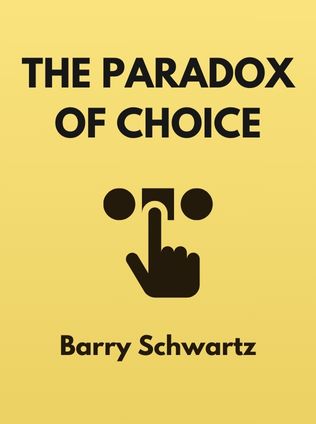
The Paradox of Choice
Why More Is Less
By Barry Schwartz
Published 01/2004
About the Author
Barry Schwartz is a distinguished professor of social theory and social action. His work delves deeply into the intersection of psychology and economics, focusing on how the choices we make impact our lives. Schwartz has made a significant contribution to understanding the paradoxes and challenges that arise from the freedom of choice, a concept that is central to modern life. His book, The Paradox of Choice, is widely regarded as a seminal work in this area, blending rigorous research with relatable personal anecdotes. Schwartz’s writing is characterized by its clarity, accessibility, and relevance, making complex ideas understandable to a broad audience.
Main Idea
In The Paradox of Choice, Barry Schwartz argues that the abundance of choices available in modern society does not necessarily lead to greater freedom or happiness. Instead, the overwhelming array of options can lead to anxiety, indecision, and dissatisfaction. Schwartz asserts that while choice is essential for autonomy and well-being, there is a threshold beyond which more choices become detrimental. This book explores the psychological and social implications of expanded choice, offering insights into how individuals can navigate this complex landscape to make better decisions and live more fulfilling lives.
Table of Contents
- Introduction: The Choice Overload
- Three Categories of Choice
- The Consequences of Expanded Choice
- How and Why We Choose
- Psychological Biases in Decision-Making
- Maximizing vs. Satisficing
- How Choice Affects Happiness
- Pitfalls of Too Much Choice
Introduction: The Choice Overload
Barry Schwartz begins The Paradox of Choice by introducing the concept of choice overload, a phenomenon where having too many options can lead to a paradoxical effect—rather than feeling liberated, we feel overwhelmed. Schwartz suggests that in our pursuit of the perfect option, we often become paralyzed by indecision or later dissatisfied with our choices.
"Learning to choose is hard. Learning to choose well is harder. And learning to choose well in a world of unlimited possibilities is harder still, perhaps too hard." - Barry Schwartz
This introductory concept sets the stage for the rest of the book, where Schwartz explores the impact of excessive choice on our lives and provides practical strategies for managing it.
Three Categories of Choice
Consumer Choices
Schwartz categorizes choices into three broad areas, starting with consumer choices. These are the everyday decisions we make about purchasing goods and services, from groceries to gadgets. Schwartz argues that the proliferation of consumer choices has made even simple decisions unnecessarily complicated.
Consider a trip to the supermarket. The average shopper is bombarded with hundreds of options for products as simple as bread or cereal. Schwartz notes that while these choices might seem trivial, they consume mental energy and time, leading to decision fatigue. He differentiates between durable goods, like appliances, and nondurable goods, like food, explaining that durable goods warrant more deliberation due to their long-term use, whereas nondurable goods do not justify extensive decision-making.
- Choosing between 30 brands of cereal in the supermarket.
- Deciding which new smartphone model to buy out of dozens available.
- Selecting a new car with multiple customizable features.
In these examples, the sheer number of choices forces consumers to invest time and energy in decisions that might otherwise be straightforward. Schwartz suggests that simplifying these choices or limiting the options we consider can help reduce stress and improve satisfaction with our decisions.
Complex Choices
The second category, complex choices, involves decisions about intangibles that have significant implications for our lives, such as insurance, education, and retirement. Schwartz highlights how the expansion of options in these areas has made decision-making more challenging.
Sign up for FREE and get access to 1,400+ books summaries.
You May Also Like
The Subtle Art of Not Giving a F*ck
A Counterintuitive Approach to Living a Good Life
By Mark MansonRich Dad Poor Dad
What the Rich Teach Their Kids About Money - That the Poor and Middle Class Do Not!
By Robert T. KiyosakiHow To Win Friends and Influence People
The All-Time Classic Manual Of People Skills
By Dale CarnegieFreakonomics
A Rogue Economist Explores the Hidden Side of Everything
By Steven D. Levitt and Stephen J. Dubner



















